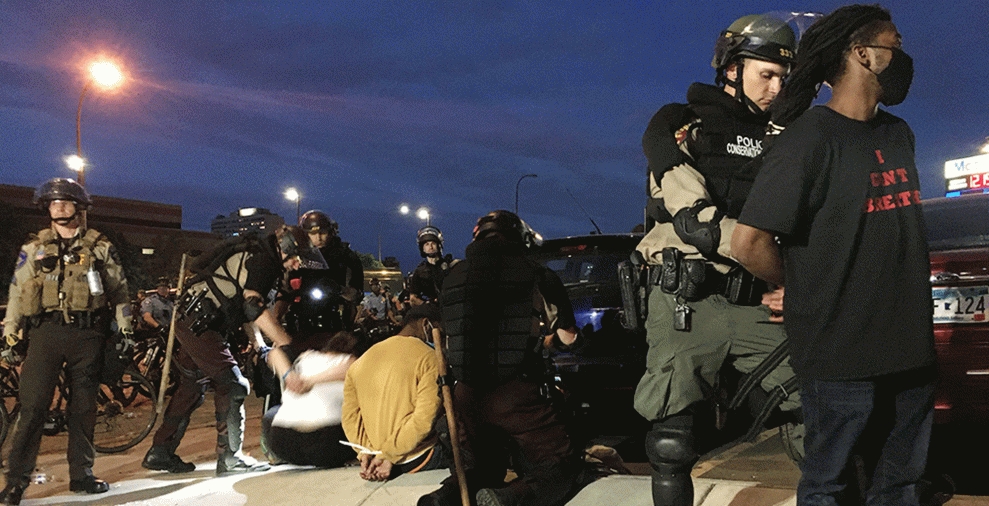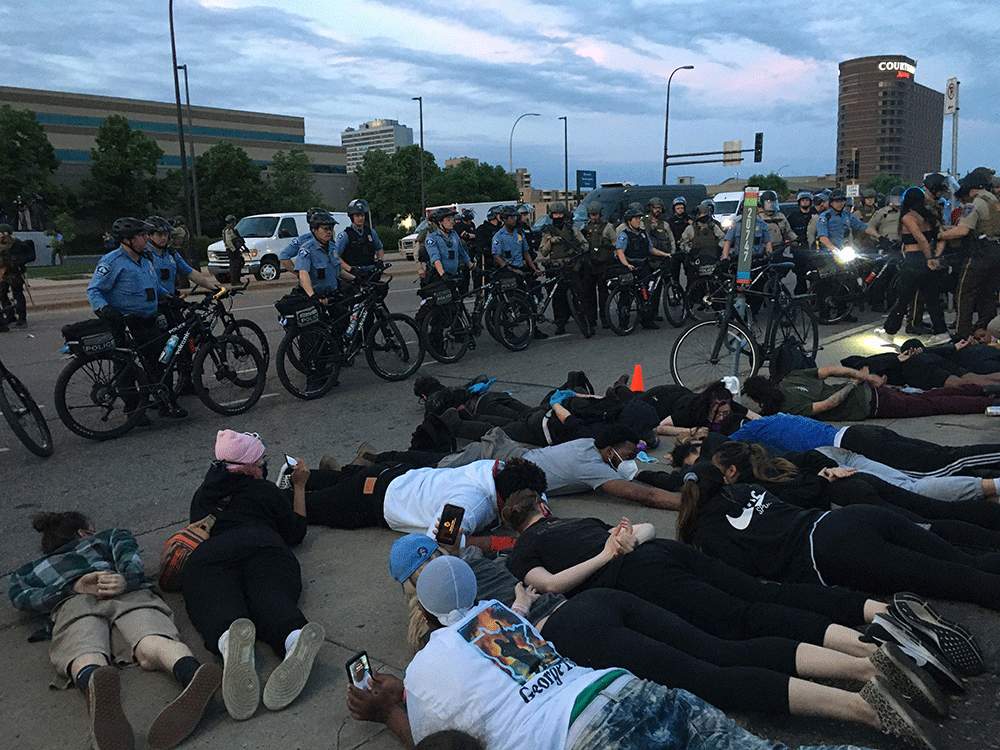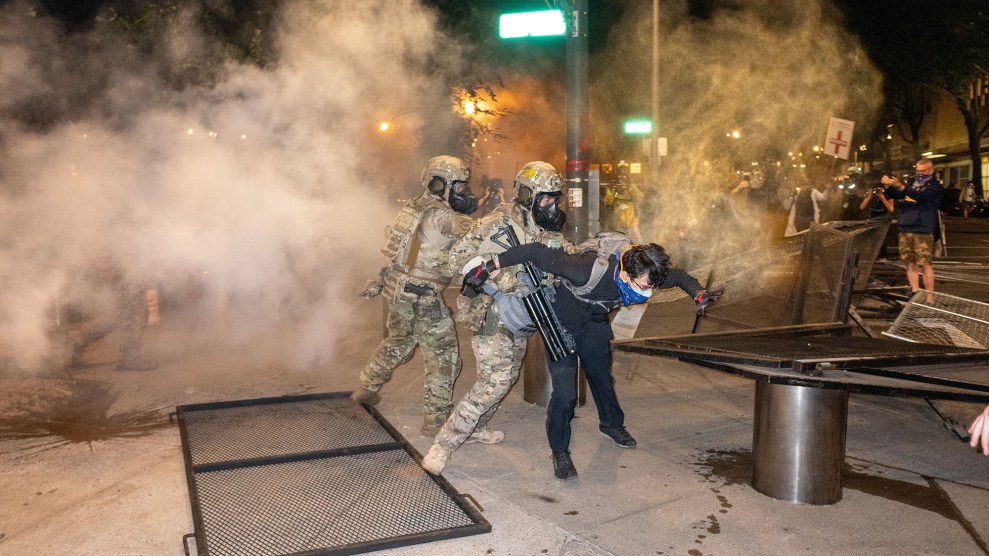
Hundreds of peaceful protesters face charges in Minneapolis.Julia Lurie/Mother Jones
Six days after George Floyd’s death, Ahmed Abebe and some friends joined a protest marching towards Interstate 35W in Minneapolis. “I’ve been a resident of Minnesota my whole life. I’m a black man,” said 25-year-old Abebe. “So going out to the protests was something that was meaningful to me—something that hits me straight to the core.”
Just after the 8 p.m. curfew, a swarm of city cops, state troopers, and National Guardsmen surrounded the group of 150 peaceful protesters on four sides. Using tear gas, flash grenades, and rubber bullets, the officers corralled the protesters into a parking lot, ordered them to lie on the ground, and informed them over a loudspeaker that they were being arrested.
“That was my ‘Oh shit’ moment,” remembers Abebe, whose name has been changed to protect his privacy. Over the next few hours, they were zip-tied one by one and brought to police vans and buses, which took them to the Hennepin County Jail.
While the protests have died down in Minneapolis, their effects linger: According to data from the Minneapolis City Attorney’s Office, more than 500 people still face charges from the days of unrest after Floyd’s death.
A fraction of those are felonies. The Hennepin County Attorney’s Office is prosecuting roughly 15 people—mostly for alleged burglaries from businesses including Foot Locker, AT&T, and Target. (Critics note that the same office didn’t charge three cops at the scene of Floyd’s death.) The US Attorney’s Office has so far charged 13 people with federal offenses, including three men for allegedly burning down the city’s Third Police Precinct.
But the vast majority of the cases involve people peacefully protesting after curfew. Abebe is among 493 people, many of whom are young Black and brown Minneapolis residents, faced with charges of violating the executive curfew order or unlawful assembly—nonviolent misdemeanors punishable by 90 days in jail or a $1,000 fine.
“People are having to face having this charge be something that can be searched out about them by potential employers or schools,” said Jared Mollenkof, a public defender in Hennepin County who is on the board of the Minnesota Freedom Fund, which raised millions to bail out protesters during the unrest.
Minneapolis stands in stark contrast with neighboring St. Paul, where City Attorney Lyndsey Olsen decided to dismiss cases against protesters who weren’t violent or threatening “in the interest of justice,” according to a statement.
As he sat zip-tied, Abebe thought of his parents, refugees from Ethiopia who “put us here to have a better life than they did growing up,” he said. Abebe recently graduated from a master’s program and started his first job, on the tech team at a healthcare company. “I’m definitely very, very scared about what could possibly happen if this gets on my record” he said. “I don’t want something like this to ruin my chances of a dream job.”
Deondre Moore, a 25-year-old HIV activist among the arrestees who traveled from Beaumont, Texas, to participate in the protests, thought of his mother. She’d been watching the evening’s events unfold on his Facebook Live feed. “I’m a mama’s boy,” said Moore. “So I kept thinking, ‘Oh, mom—she’s gonna be so scared for me.”

Julia Lurie
Another arrestee, a physician, said he was protesting not just Floyd’s death, but gaping healthcare disparities across the country. He works at the Hennepin County Medical Center, where Floyd was pronounced dead. “Minneapolis prides itself on being a liberal city,” he said. “My experience here is that’s not so true—especially working at the county hospital and seeing a lot of the inequities tragically play out time and time again.”
Outside the jail, in the wee hours of June 1, officers called protesters off the buses one by one, served them with their citations, and released them. “It was clear that there was a lot of confusion” among officers, says Dan Bellandi, a 44-year-old software engineer among the arrestees. “I heard them asking, ‘What are we charging them with? Is it just the one number or is it two numbers?’” Indeed, the citations varied among the five protesters I spoke to from that night: some were charged with both violating curfew and unlawful assembly, others just with violating curfew.
The Minneapolis City Attorney’s Office is “considering dismissing cases where there is no violence or other egregious conduct,” a spokesperson told me. But in the meantime, says Mollenkof, the criminal defense lawyer, “it ends up taking up a lot of emotional energy and resources to deal with having the power of the state marshaled against you.”
Indeed, arrestees have convened regularly in a Minneapolis park to strategize how to get legal fees covered and charges dropped. “This is part of the silencing,” said arrestee Metadel Lee, a junior in college spearheading the organizing efforts. “This is just part of the system that keeps us from actually making sure that we live in a more equitable society.”
Over the phone recently, Abebe admitted that the charges had been hanging over him ever since that night in May. “I’ve worked really hard all my life to try to stand up for what’s right,” he said. He noted that the charges are an example of the very thing he was protesting: police overreaction and inequities in the criminal justice system. “It’s very ironic, isn’t it?”










